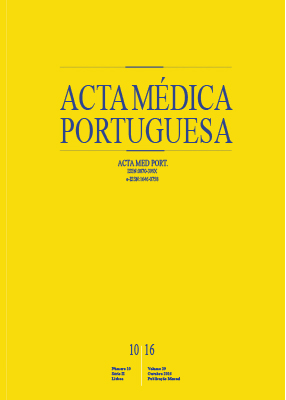Phenotypic Heterogeneity by Germline Mismatch Repair Gene Defect in Lynch Syndrome Patients
DOI:
https://doi.org/10.20344/amp.7774Keywords:
Colorectal Neoplasms, Hereditary Nonpolyposis, DNA Mismatch Repair, DNA Repair-Deficiency Disorders, Endometrial Neoplasms, Neoplastic Syndromes, Hereditary.Abstract
Introduction: Lynch syndrome is the most common form of hereditary colorectal cancer, being also responsible for endometrial and other types of cancers. It is associated with germline mutations in DNA mismatch repair genes and microsatellite instability. MLH1 and MSH2 mutations have a “classical” Lynch syndrome phenotype, with MSH2 having a higher association with extracolonic cancer. MSH6 and PMS2 mutations have an atypical phenotype. Clinical expression is heterogeneous, with correlation between mismatch repair mutated gene and phenotypic patterns.
Material and Methods: We retrospectively analyzed data from patients fulfilling Amsterdam criteria or having mismatch repair gene mutations, between September 2012 and October 2015.
Results: We identified 28 patients. Seventeen had colorectal cancer with right colon predominance. Five developed endometrial cancer (median age of diagnosis – 53), with no MSH6 mutations. Five developed other cancers. All mutated mismatch repair cases studied had microsatellite instability.
Discussion: Most cases had MSH2 mutations despite MLH1 being described in the literature as the most frequently mutated. Interestingly, colorectal cancer patients showed no tendency for high inflammatory infiltrate. Despite the high incidence of synchronous and metachronous tumours, most patients underwent a partial colectomy. Prophylactic hysterectomy and adnexectomy was performed in menopausal/perimenopausal patients.
Conclusion: A standardized registration of patient’s data may lead to better management and knowledge about Lynch syndrome. Use of Bethesda Guidelines might identify new cases non-identified by Amsterdam criteria. Microsatellite instability analysis must be performed in a much larger scale. The genotypic/phenotypic correlation described in the literature was not verified in our study with statistical significance, perhaps due to small data sample and insufficient clinical registration.
Downloads
Downloads
Published
How to Cite
Issue
Section
License
All the articles published in the AMP are open access and comply with the requirements of funding agencies or academic institutions. The AMP is governed by the terms of the Creative Commons ‘Attribution – Non-Commercial Use - (CC-BY-NC)’ license, regarding the use by third parties.
It is the author’s responsibility to obtain approval for the reproduction of figures, tables, etc. from other publications.
Upon acceptance of an article for publication, the authors will be asked to complete the ICMJE “Copyright Liability and Copyright Sharing Statement “(http://www.actamedicaportuguesa.com/info/AMP-NormasPublicacao.pdf) and the “Declaration of Potential Conflicts of Interest” (http:// www.icmje.org/conflicts-of-interest). An e-mail will be sent to the corresponding author to acknowledge receipt of the manuscript.
After publication, the authors are authorised to make their articles available in repositories of their institutions of origin, as long as they always mention where they were published and according to the Creative Commons license.









